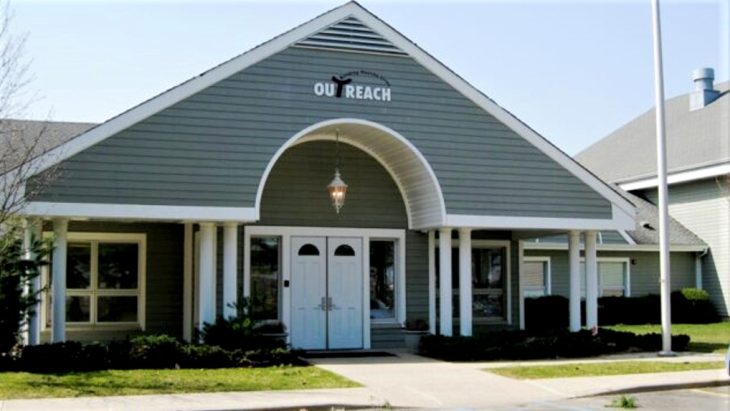Outreach House Brentwood Crooked Hill Road

About Outreach House Brentwood Crooked Hill Road
Outreach’s Crooked Hill Road residential campus offers hope to Long Island teens struggling with substance use disorder, co-occurring mental health issues, and those navigating the juvenile justice system. This program is housed in a modern facility on Crooked Hill Road in the hamlet of Brentwood, New York. The location is accessible via major highways like the Sagtikos Parkway and Long Island Expressway. SCT bus routes serve the area. Brentwood LIRR Station is about 2.5 miles south and provides rail access to Long Island.
The facility offers a calming, relaxing and supportive environment for healing, personal growth, and development. It’s fully equipped with a large gym housing an indoor basketball court, ping pong table, and modern cardio and fitness equipment. There’s a large dining area where residents enjoy highly nutritious meals thrice daily. There’s a patio for relaxation, a large classroom for group learning, and a music area for creative expression in a respectful and nonjudgmental manner.
Comprehensive Support for Lasting Healing
Residential care in Outreach House II is tailored to meet the psychosocial developmental needs of adolescents as young as 12. Treatment integrates positive peer interactions alongside structured vocational training and reflective introspection. They specifically follow the modified therapeutic community model. Experts interdisciplinary professionals deliver individual and group therapy rooted in clinically proven cognitive behavioral techniques. This helps teens develop healthy coping skills and build resilience in recovery.
These clinical practices are backed up by educational seminars, health awareness groups and anger management classes. The program also includes domestic/teen violence workshops, sober maintenance activities, and vocational education. Teens also attend a full-day, onsite academic program to continue their education without interruption while receiving treatment.
Residents with co-occurring disorders have access to nursing and psychiatric care, including medication assisted treatment (MAT) as relevant to their individualized recovery needs. This program emphasizes family involvement with therapy to address the sensitive needs of individual families and foster positive family dynamics. Toxicology testing monitors progress and compliance with treatment guidelines.
The facility offers aftercare support to keep residents on track and ensure sustained recovery upon graduation. This primarily involves outpatient counseling to ease the transition back to home and community. It’s all about helping teens get well, stay substance-free and build a healthy life as they grow into adulthood.
| Levels of Care | Detox Service Setting | Programs | Payment Options | ||
|---|---|---|---|---|---|
|
Inpatient and residential programs provide round-the-clock medical and emotional support as you live at the treatment facility. This level of care may be recommended if you have severe addictions or mental health conditions since it removes outside distractions and allows you to focus solely on therapy. |
Aftercare programs provide ongoing support after you complete a rehab program. They may include several components to help you maintain sobriety including therapy, community support groups and relapse prevention strategies. This gives you a network of resources as you reintegrate into your daily life. |
Dual diagnosis programs address substance use disorders and co-occurring mental health conditions simultaneously. This integrated approach to care improves the likelihood of long term recovery and stability by addressing the root causes of addiction. |
|||
|
Inpatient detox occurs in a dedicated treatment facility. You’ll live there around the clock and receive intensive medical support and supervision to help manage your withdrawal symptoms. It is suitable for individuals with moderate to severe addictions as it ensures a stable detox environment. |
|||||
|
Alcohol detox programs offer medical support to help individuals withdraw safely from alcohol. Your care team may use medications to ease your symptoms and provide medical monitoring to address complications. |
Cognitive behavioral therapy focuses on changing harmful thought patterns and behaviors associated with addiction. You’ll learn healthier coping mechanisms by identifying and replacing negative thoughts. This improves your emotional resilience and decreases your relapse potential. |
Men's programs address substance use while also considering the social pressures, family roles and mental health concerns that are specific to men. You’ll learn healthy coping mechanisms as you build emotional resilience and develop communication skills. |
Opioid detox uses medications to ease severe withdrawal symptoms. It also includes medical supervision to help you manage potential complications. These services allow you to stabilize and begin a recovery plan. |
Women's programs offer a safe and supportive space to focus on gender specific issues such as trauma, family roles and mental health conditions. Therapists tailor the sessions to address women's needs and foster empowerment in a healing and nurturing environment. |
Young adult programs are designed for individuals who are transitioning into adulthood. Topics of discussion typically include identity, independence and peer relationships. Providers may also offer life skills training and career support. |
|
Payment Assistance
|
Medicaid
|
Medicare
|
Military Insurance
|
Private Insurance
|
Self Pay
|
Levels of Care
Inpatient and residential programs provide round-the-clock medical and emotional support as you live at the treatment facility. This level of care may be recommended if you have severe addictions or mental health conditions since it removes outside distractions and allows you to focus solely on therapy.
Aftercare programs provide ongoing support after you complete a rehab program. They may include several components to help you maintain sobriety including therapy, community support groups and relapse prevention strategies. This gives you a network of resources as you reintegrate into your daily life.
Dual diagnosis programs address substance use disorders and co-occurring mental health conditions simultaneously. This integrated approach to care improves the likelihood of long term recovery and stability by addressing the root causes of addiction.
Detox Service Setting
Inpatient detox occurs in a dedicated treatment facility. You’ll live there around the clock and receive intensive medical support and supervision to help manage your withdrawal symptoms. It is suitable for individuals with moderate to severe addictions as it ensures a stable detox environment.
Programs
Alcohol detox programs offer medical support to help individuals withdraw safely from alcohol. Your care team may use medications to ease your symptoms and provide medical monitoring to address complications.
Cognitive behavioral therapy focuses on changing harmful thought patterns and behaviors associated with addiction. You’ll learn healthier coping mechanisms by identifying and replacing negative thoughts. This improves your emotional resilience and decreases your relapse potential.
Men's programs address substance use while also considering the social pressures, family roles and mental health concerns that are specific to men. You’ll learn healthy coping mechanisms as you build emotional resilience and develop communication skills.
Opioid detox uses medications to ease severe withdrawal symptoms. It also includes medical supervision to help you manage potential complications. These services allow you to stabilize and begin a recovery plan.
Women's programs offer a safe and supportive space to focus on gender specific issues such as trauma, family roles and mental health conditions. Therapists tailor the sessions to address women's needs and foster empowerment in a healing and nurturing environment.
Young adult programs are designed for individuals who are transitioning into adulthood. Topics of discussion typically include identity, independence and peer relationships. Providers may also offer life skills training and career support.
Accreditations
Contact

Chika Uchendu is a multi-niche and seasoned SEO writer with expertise in personal finance, technology and health. He’s had over 10 years of experience creating impactful content that resonates with diverse audiences. His journalism and digital marketing background enables him to combine data-driven analysis with engaging storytelling. This helps drive engagement and grants target audiences access to valuable information.
Chika has worked for Benzinga, Motley Fool, Webopedia and many other popular online media outlets on a freelance and contractual basis. He is using his voice to drive awareness and meaningful change among people dealing with the pandemic of substance use disorder. Chika is an ambivert who enjoys sports, hiking, reading and video gaming.

Peter W.Y. Lee is a historian with a focus in American Cold War culture. He has examined how popular culture has served as a coping mechanism for the challenges and changes impacting American society throughout the twentieth century.



